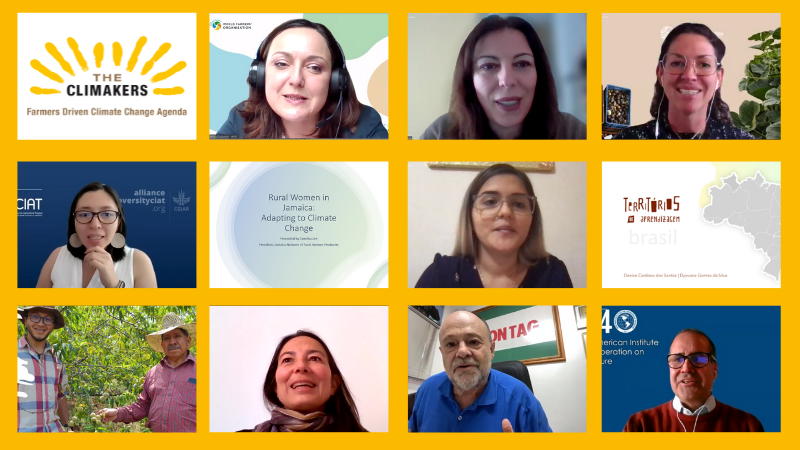Rome, Italy, April 13, 2022 – Today, THE CLIMAKERS community from Latin America and the Caribbean, farmers and other stakeholders of the agricultural sector, convened digitally for a forward-looking discussion on how to strengthen the capacity of farmers and farmers’ organisations to advocate for successful, replicable and scalable farming practices in the development by governments of their Nationally Determined Contributions (NDCs) in the implementation of the Paris Agreement.
Jointly organised by the World Farmers’ Organisation (WFO) and PROCASUR, under THE CLIMAKERS initiative, the one-day digital event “Strengthening Farmers Advocacy in Shaping NDCs: Farmers to Farmers Knowledge Exchange″ offered an excellent venue for farmers from the LAC Region to know more about the NDCs guidelines: “THE CLIMAKERS Guidelines for Policy Makers” developed and assessed by CIAT/CGIAR and presented globally at COP26.
Opening remarks were made by the WFO Secretary General Arianna Giuliodori and Morgan Gillespy, Director at Food and Land Use Coalition (FOLU).
“Nothing is stronger than farmers across the globe joining their hands”
“The fact that we are here today together proves that nothing is stronger than farmers across the globe joining their hands and their voices.” highlighted immediately the WFO Secretary General, while welcoming all the participants and setting the scene for a forward-looking exchange.
During her remarks, FOLU Director emphasized that farmers need to be recognised as part of the solution rather than the problem.
Farmers carry an uneven burden in terms of climate change impacts and the fragilities emerged from the COVID-19 pandemic and must be put at the centre of the ‘just rural transition’.
“FOLU is committed to strengthening farmer engagement in international processes, so we are so happy to work with THE CLIMAKERS initiative to elevate and amplify the voice of farmers,” she said. “We support a bottom-up approach to ensure that food and farming are the cornerstone of international processes.”
Moderated by Luisa Volpe, WFO Head of Policy Development, the event was divided into two sessions.
The first part was led by Deissy Martínez-Barón, Regional Leader for Climate Action in Latin America, Alliance Bioversity-CIAT presenting the guidelines to the audience.
In her very comprehensive presentation of “The Climakers Guidelines for Policy Makers” she pointed out why and how agriculture is linked to global policies on the climate challenge.
Farmers’ Stories from the Field
The second part focused on the experience of farmers from the region in addressing climate change. Participants in the panel were: Tamisha Lee, President of Jamaica Network of Rural Women Producers; Denise Cardoso dos Santos, President of Cooperativa Agropecuária Familiar de Canudos, Uauá e Curaçá Territorio de Aprendizaje, Brazil; Dyovana Gomes da Silva, President of Associação Cultural dos Jovens Rurais da Comunidade de Riacho de Pedra Territorio de Aprendizaje; Aidali N. Caballero D., Manager of Finca Agroturística Sendero la Pantera and Representative de la Red de Juventudes Rurales de Panamá; Eduardo Benjamín López Velásquez, Manager of Flor de Tierra Guatemala and Representative de la Red de Juventudes Rurales de Guatemala.
They shared with the audience what climate change means for farmers in Latin America and the Caribbean and which best practices they are implementing to cope with these unprecedented challenges.
Farmers stand ready to do their part in finding solutions to climate crisis
Closing remarks were given by Alberto Broch, President, Confederación de Organizaciones de Productores Familiares del Mercosur Ampliado and Lloyd Day, Deputy Director General of the Instituto Interamericano de Cooperación para la Agricultura (IICA).
President Alberto Broch remindedthe audience that “Climate change is already here, and we need to be involved to face this challenge caused mainly by men and suffered first by farmers.”
Mr Lloyd Day, took the chance to reiterate that “Farmers help feed the world, therefore, as the important breadbasket for global security, we must have a voice.”


